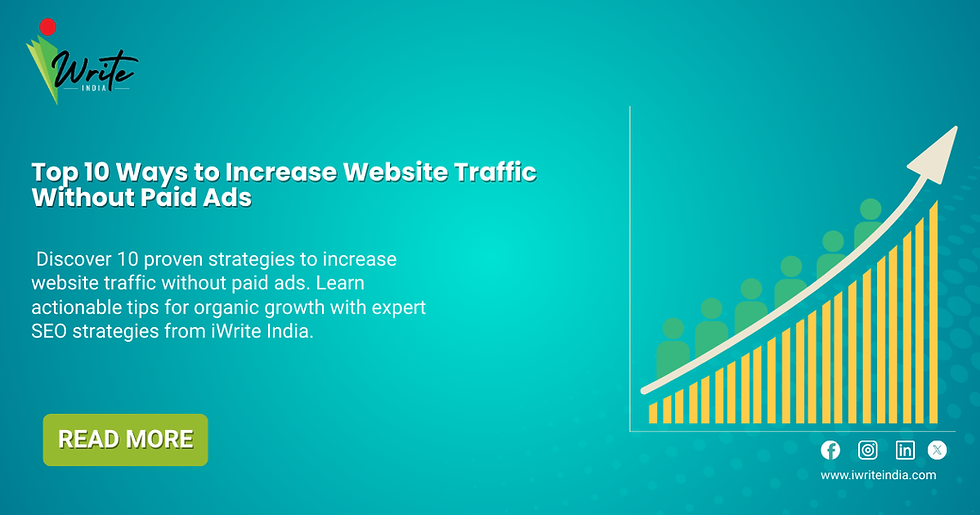Performance Marketing: A Beginner's Guide for 2025
- iWrite India
- Apr 30
- 4 min read

In a world obsessed with return on investment (ROI), performance marketing is a digital marketing superstar. As we step into 2025, brands are shifting from traditional marketing to models that offer tangible, measurable results. Performance marketing is exactly that—it allows you to pay for real outcomes rather than vague promises.
This guide will walk you through everything you need to know about performance marketing—from basic definitions to advanced strategies, common platforms, latest trends, and actionable insights to launch your campaigns effectively.
What is Performance Marketing?
Performance marketing is a results-based marketing approach where advertisers only pay when a specific action—like a sale, click, or lead—is completed. It encompasses digital channels such as search engines, social media, affiliate networks, and display advertising. Unlike traditional advertising where you pay upfront for visibility, performance marketing ties costs directly to results.
In 2025, it has evolved into a sophisticated ecosystem powered by AI, automation, and data analytics, making it the preferred choice for businesses looking to optimize their marketing budgets.
Types of Performance Marketing
Understanding the types of performance marketing is crucial to choosing the right channels for your brand.
1. Affiliate Marketing
Brands collaborate with third-party affiliates who promote products/services and earn a commission for each conversion.
2. Pay-Per-Click (PPC)
Commonly seen in Google Ads and Bing Ads, where advertisers pay for each click on their ad.
3. Social Media Advertising
Platforms like Meta, LinkedIn, and TikTok allow performance-based advertising tailored to user behavior.
4. Influencer Marketing
Brands pay influencers based on the performance of their posts, such as link clicks or discount code usage.
5. Native Advertising
These are sponsored ads that match the look and feel of the platform, often paid per engagement or conversion.
Benefits of Performance Marketing
Here’s why marketers are increasingly adopting performance-based models:
Measurable ROI: Track every dollar spent.
Budget-Friendly: Spend only on actual results.
Targeted Reach: Hyper-personalized campaigns increase conversions.
Scalability: Scale successful campaigns rapidly.
Data-Driven Insights: Continuous optimization based on analytics.
These benefits of performance marketing make it a cornerstone of modern digital strategies.
Creating an Effective Performance Marketing Strategy
A successful performance marketing strategy in 2025 involves:
1. Goal Setting
Define what “performance” means for your brand—clicks, signups, purchases, etc.
2. Platform Selection
Choose platforms based on your audience’s behavior and campaign goals.
3. Funnel Planning
Design user journeys from awareness to conversion.
4. Creative Development
Craft compelling ad creatives that prompt action.
5. Tracking and Analytics
Use tools like Google Analytics 4, Meta Pixel, and attribution software.
6. A/B Testing
Continuously test and optimize headlines, CTAs, and landing pages.
Performance Marketing Best Practices for 2025
To thrive in today’s landscape, follow these performance marketing best practices:
Leverage AI-driven bidding strategies
Use lookalike and custom audiences
Implement server-side tracking for accuracy
Diversify your ad placements
Integrate CRM and automation tools
Real-World Performance Marketing Examples
Amazon Affiliate Program – Drives millions of sales through global affiliate links.
Zomato – Uses performance ads on Instagram with discount codes to drive orders.
Nike – Runs influencer-based campaigns where payments depend on sales tracked via UTM links.
These performance marketing examples show the flexibility and success of results-oriented marketing.
Why Choose a Performance Based Marketing Agency?
Partnering with a performance based marketing agency brings you:
Expert campaign planning and execution
Access to premium tools and ad networks
Real-time campaign adjustments
Better ROI tracking and analytics
Especially if you're seeking performance marketing services in Delhi, you’ll benefit from local market insights and cost-effective solutions.
iWrite India: Your Performance Marketing Company in Delhi
Looking for a result-driven performance marketing company in Delhi? iWrite India combines strategic vision with hands-on execution to deliver meaningful business results. Our team is passionate about performance and precision, ensuring every rupee spent works harder for your brand.
Explore our full range of performance marketing services including:
Paid ad campaigns
Affiliate marketing
Retargeting strategies
Influencer collaborations
Quick Takeaway for Instant Understanding
Performance marketing is a data-driven approach where advertisers pay only when specific actions are completed—like clicks, leads, or sales. In 2025, it continues to dominate digital strategies due to its ROI-focused model. Key types include affiliate, search engine, social media, and influencer marketing. A strong performance marketing strategy hinges on precise targeting, real-time analytics, and continuous optimization. Ideal for brands seeking measurable growth.
FAQs
1. How is performance marketing different from digital marketing?
Digital marketing includes all forms of online promotion. Performance marketing is a subset focused on measurable actions like clicks and conversions.
2. What platforms are best for performance marketing in 2025?
Google Ads, Meta (Facebook and Instagram), LinkedIn, TikTok, and affiliate networks like Impact and ShareASale are excellent options.
3. What budget should I start with for a performance marketing campaign?
Even a small budget (INR 10,000–25,000/month) can yield good results if well-targeted and optimized.
4. Is performance marketing suitable for small businesses?
Absolutely. Its pay-for-results model is ideal for SMEs seeking ROI-driven marketing.
5. How can I track conversions effectively?
Use tools like Google Tag Manager, Meta Pixel, and server-side tracking to ensure accurate data attribution.




![Top 5 Digital Marketing Agencies in Delhi [2025 Updated]](https://static.wixstatic.com/media/53afe3_a718f2b4f3ae4a75becb77146127a742~mv2.png/v1/fill/w_980,h_515,al_c,q_90,usm_0.66_1.00_0.01,enc_avif,quality_auto/53afe3_a718f2b4f3ae4a75becb77146127a742~mv2.png)

Comments